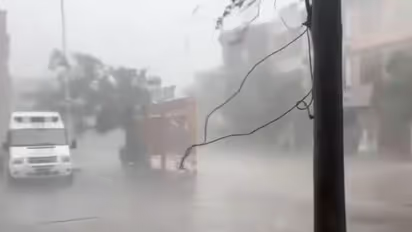At least 14 killed, over 150 injured as super typhoon Yagi batters Vietnam; dramatic videos surface (WATCH)

Synopsis
Typhoon Yagi, the most powerful storm to strike Asia this year, has been downgraded to a tropical depression after wreaking havoc across northern Vietnam, China's Hainan province, and the Philippines.
Typhoon Yagi, the most powerful storm to strike Asia this year, has been downgraded to a tropical depression after wreaking havoc across northern Vietnam, China's Hainan province, and the Philippines. The storm, which made landfall in Vietnam on Saturday afternoon with wind speeds reaching 149 km/h, has claimed at least 14 lives in Vietnam, with ongoing concerns about potential flooding and landslides.
Typhoon Yagi's impact has been severe. In northern Vietnam, the storm caused widespread destruction, including significant flooding and infrastructure damage. The Vietnamese government reported that the storm resulted in at least four deaths in Hanoi, the capital, with preliminary reports suggesting further casualties as recovery operations continue. The storm also caused fatalities in Hoa Binh province, approximately 100 km south of Hanoi, where a landslide claimed four lives. In total, Vietnam has reported 14 deaths, with more than 150 people injured.
Hanoi, a city of 8.5 million, has struggled to cope with the aftermath. The storm toppled trees, damaged homes, and disrupted power and telecommunications. Despite the chaos, Hanoi's Noi Bai International Airport has resumed operations, and efforts are underway to restore normalcy. Residents have reported extensive damage, with trees falling on homes and streets, complicating cleanup and recovery efforts.
In Hainan, China, the storm led to four reported deaths and significant damage. The Chinese government has mobilized emergency response teams to address the devastation. Similarly, the Philippines has been heavily impacted, with the storm resulting in 20 fatalities, several missing individuals, and over two million people affected. Landslides and widespread flooding have displaced more than 47,600 people from their homes.
The Vietnamese government has taken extensive measures to mitigate the storm's impact. Over 50,000 people were evacuated from coastal towns, and 450,000 military personnel were deployed for rescue and relief efforts. Authorities also closed several airports, including Hanoi’s Noi Bai, and suspended public transportation in affected areas.
In southern China, Typhoon Yagi made landfalls in Hainan province’s Wenchang city and Guangdong province's Xuwen County. The storm forced the evacuation of nearly one million people across the affected regions. In Hainan, authorities issued top emergency response alerts, and residents prepared for potential floods by building sandbag barriers and reinforcing windows.
Despite being downgraded, Typhoon Yagi continues to pose risks as it progresses westward. The Vietnamese meteorological agency has issued warnings about ongoing potential flooding and landslides. The storm's weakening does not diminish the threat of further damage and disruption in the affected regions.
Experts are increasingly linking the intensity of storms like Typhoon Yagi to climate change. Benjamin Horton, director of the Earth Observatory of Singapore, explained that warmer ocean waters are providing more energy to fuel such storms, leading to increased wind speeds and heavier rainfall. He emphasized the need for countries to enhance their resilience to strong storms through improved infrastructure and protective measures for natural systems.
As recovery efforts continue, the affected regions are grappling with the extensive damage caused by one of the most powerful storms of the year. The international community is closely monitoring the situation, with relief and aid efforts underway to support those impacted by Typhoon Yagi's devastating path.
Check the Breaking News Today and Latest News from across India and around the world. Stay updated with the latest World News and global developments from politics to economy and current affairs. Get in-depth coverage of China News, Europe News, Pakistan News, and South Asia News, along with top headlines from the UK and US. Follow expert analysis, international trends, and breaking updates from around the globe. Download the Asianet News Official App from the Android Play Store and iPhone App Store for accurate and timely news updates anytime, anywhere.